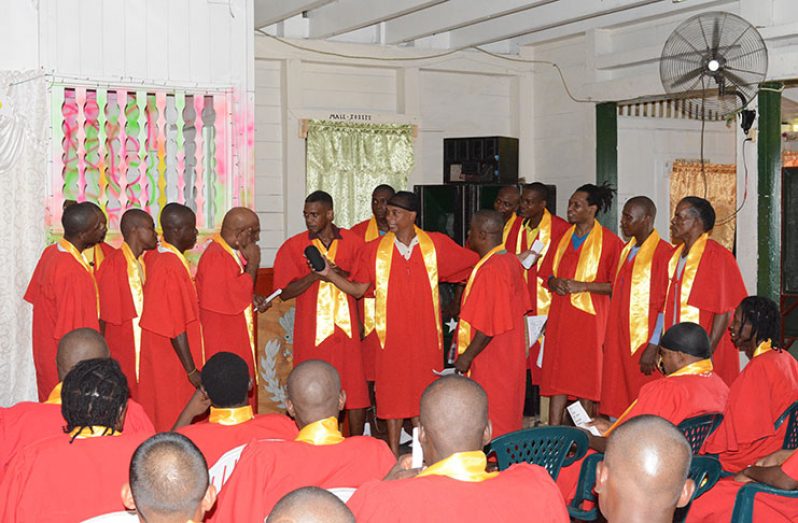Story and photos by Rabindra Rooplall
HELPING inmates to understand that anger is an emotional feeling that can be controlled if properly managed, is an important step in educating prisoners, regarding their survival behind bars and eventual reintegration into society.
This was the collective view of inmates during a group skit at the Mazaruni Prison (Cuyuni/ Mazaruni) recently, where 60 inmates graduated from a three-month anger management programme.
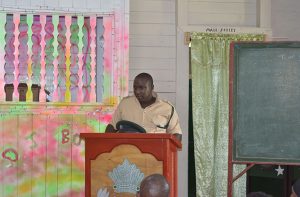
Officer-in-Charge of Prisoners’ Welfare and Training, Marielle Bristol, said the anger management programme is conducted across the board at all prisons.
The programme started over a year ago and is making an impact.
“Since the programme commenced, we have had a decrease in prisoner-to- prisoner violence and the officers have been indicting the impact that programme has had and how it made their job less stressful and with less conflict,” the prison welfare officer said.
Bristol said that because it is a cognitive change programme, it really has a positive impact on behaviour practices and traits.
She said the 12-week training “is by nowhere enough, but it is adequate in giving them that basis they need to understand what anger is and to understand to manage more than just anger but the other emotions as well, and that is the key to continued management”.
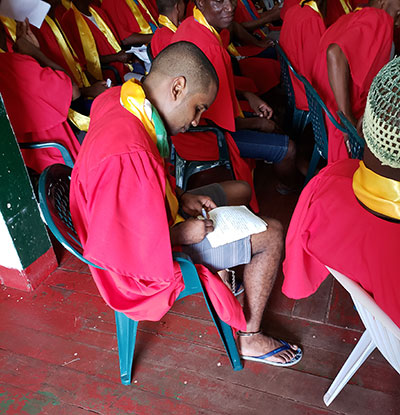
Bristol added: “If your emotions start to control you, then again there is where you are going to run into problems.”
Pastor Hubert Jack, who was part of the programme, said the focus of attention was on psychotherapy, relative to anger management.
“We have included a number of subjects in this programme that catered for not only the inmates stay here, but when they would have left,” the pastor explained.
He said when inmates leave the prison, they will return to their families and the programme dealt with scenarios and how to handle anger and proper behaviour once reintegrated into society.
A BETTER SOLUTION
Programme Manager, Denise McKenzie, said the anger management programme shows inmates a better solution to navigate anger.
She said the approach was not merely to impart knowledge but to provide behaviour modification therapy while providing emotional awareness to inmates.
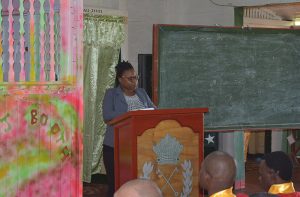
“This has proven to be very effective, we know this because the officers in charge of all the locations where we operate, reported a significant reduction in violence amongst inmates as a result of this programme,” McKenzie said.
She explained that some inmates who were labelled as security threats are now actively promoting peace and encouraging fellow inmates to join the programme.
Some ex-offenders, who graduated from the programme, said the skills they learnt helped them to re-adjust to the challenges of reintegration.
“Some even insist that the certificates that they have been issued helped them in securing employment. We find these reports very encouraging, we commend the Guyana Prison Service for including similar training for the new officer recruits and still hopeful that the prison authorities would see it fit to provide similar training, along with de-escalation skill training for all officers,” the programme manager said.
Officer-in-Charge of the Mazaruni Prison, Superintendent Carlton Cameron congratulated the graduates of the programme, noting that officers also need training in conflict resolution and anger management.
This is important, he said in defusing confrontations in prison.
IMPACT
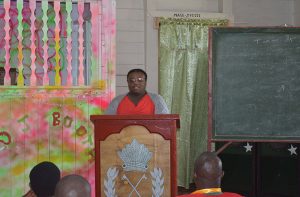
The superintendent said violence among inmates has reduced significantly but friction between warders and inmates is still there.
He advised inmates to do the right things and behave in a positive manner. This, he said, would attract an early release from prison when complemented by other factors.
Meanwhile, Psychologist and University of Guyana (UG) lecturer, Wil Campbell said the behaviour modification programme provides inmates with emotion management skills to reform their lives and to resolve conflict in constructive and non-violent ways.
According to the Prison Act, he said one element of the mandate of the Guyana Prison Service is the rehabilitation of offenders.
“Many of them are there because they didn’t have these skills in the first place and others

re-offended because they were not properly prepared to manage the challenges of reintegration,” the psychologist said.
This programme, he noted, has proven useful in reducing prison violence and it is expected that it would also reduce the recidivism rates.
“When inmates are release, they bring these new behavioural skills which will help them reintegrate with society successfully. They will be less violent, more thoughtful and more likely to consider the consequences of their actions. In short, a rehabilitated ex-offender is not just one less threat to public safety and security, but also a valuable, contributing citizen,” the psychologist explained.





.jpg)


